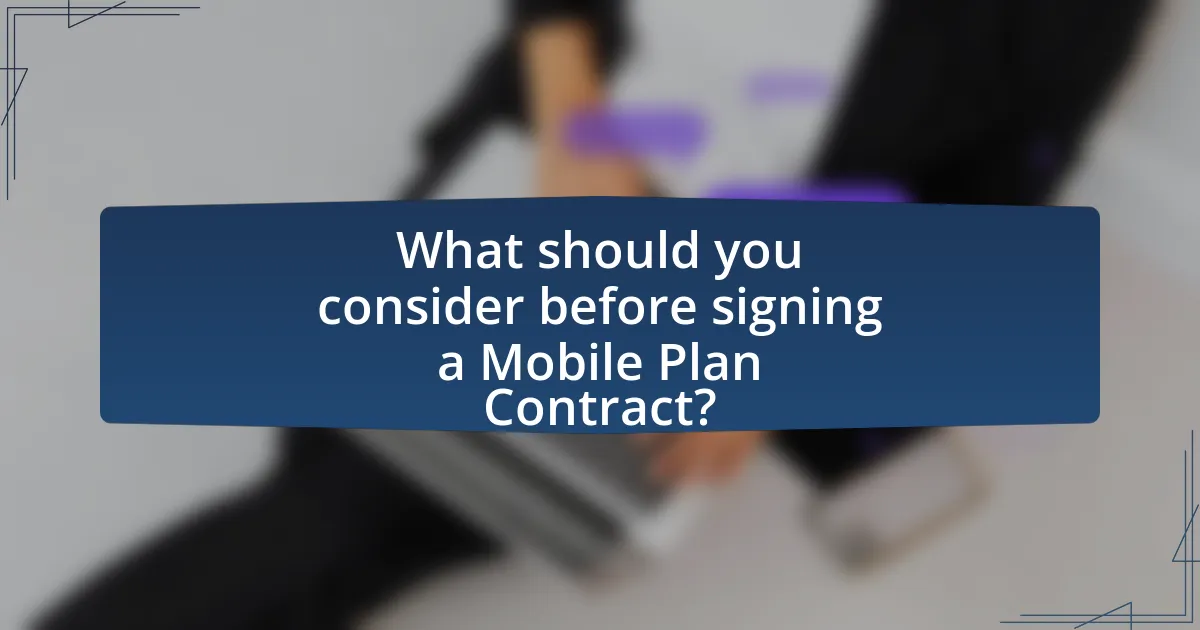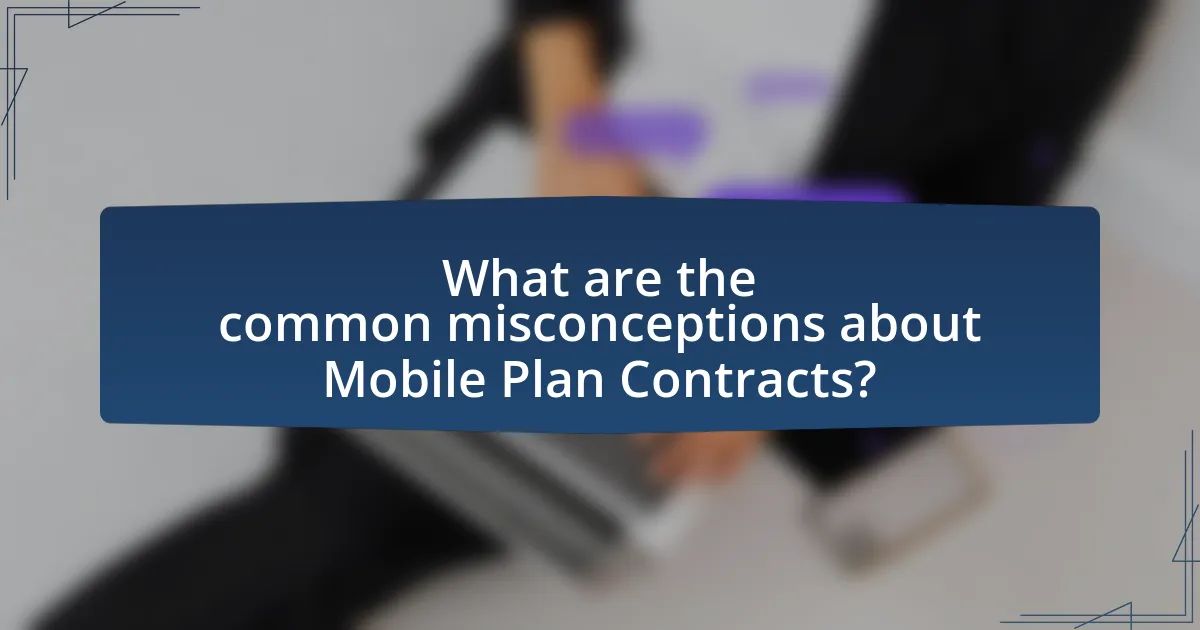Mobile plan contracts are legally binding agreements between consumers and mobile service providers that define the terms of service, including duration, pricing, and features such as data limits and talk time. This article provides a comprehensive overview of mobile plan contracts, detailing their functions, key elements, and the various types available, including postpaid, prepaid, and family plans. It emphasizes the importance of understanding contract terms, potential pitfalls, and how to negotiate better deals, while also addressing common misconceptions and best practices for reviewing contracts. Additionally, the article highlights the financial implications of mobile plan contracts and offers tips for consumers to make informed decisions regarding their mobile services.

What are Mobile Plan Contracts?
Mobile plan contracts are agreements between consumers and mobile service providers that outline the terms of service, including the duration, pricing, and included features such as data, talk time, and text messaging. These contracts typically last from one to two years and may include stipulations regarding device financing, early termination fees, and service limitations. According to the Federal Communications Commission, mobile contracts often require consumers to commit to a specific plan and may involve penalties for early cancellation, ensuring that both parties understand their obligations and rights.
How do Mobile Plan Contracts function?
Mobile plan contracts function as legally binding agreements between consumers and service providers, outlining the terms of mobile service usage. These contracts typically specify the duration of service, monthly fees, data limits, and any additional charges for exceeding those limits. For instance, a standard mobile plan may require a commitment of 12 to 24 months, during which the consumer agrees to pay a fixed monthly rate in exchange for access to voice, text, and data services. The contract also details the consequences of early termination, which often includes paying a fee proportional to the remaining contract period. This structure ensures that both parties understand their obligations and rights, facilitating a clear framework for service delivery and payment.
What key elements are included in a Mobile Plan Contract?
A Mobile Plan Contract typically includes key elements such as the duration of the contract, monthly fees, data limits, call and text allowances, device financing options, and termination fees. These components define the terms of service and the financial obligations of the customer. For instance, the duration often ranges from 12 to 24 months, while monthly fees can vary based on the chosen plan. Data limits specify the amount of mobile data available, and call and text allowances detail the number of minutes and messages included. Additionally, device financing options may outline how the cost of a phone is spread over the contract period, and termination fees indicate the costs associated with ending the contract early.
How do terms and conditions affect the contract?
Terms and conditions are essential components of a contract as they outline the rights, responsibilities, and obligations of all parties involved. These stipulations define the scope of the agreement, including payment terms, service delivery expectations, and consequences for breaches. For instance, in mobile plan contracts, terms and conditions specify data limits, billing cycles, and penalties for early termination, which directly influence the user’s experience and legal standing. The clarity and enforceability of these terms can significantly impact the resolution of disputes, as courts often rely on the documented terms to interpret the intentions of the parties.
What types of Mobile Plan Contracts are available?
There are several types of mobile plan contracts available, including postpaid, prepaid, family plans, and pay-as-you-go options. Postpaid contracts typically involve a monthly billing cycle where users pay for services after usage, often with a commitment period. Prepaid plans require users to pay upfront for a set amount of service, allowing for greater control over spending. Family plans enable multiple lines under a single account, often at a discounted rate. Pay-as-you-go options allow users to pay only for the services they use without a long-term commitment. These categories reflect the diverse needs of consumers in the mobile market.
What is the difference between prepaid and postpaid plans?
Prepaid plans require users to pay for services in advance, while postpaid plans bill users after services have been used. In prepaid plans, customers purchase a specific amount of data, talk time, or text messages upfront, which they can use until the balance runs out. In contrast, postpaid plans typically involve a monthly billing cycle where users receive a bill for the services consumed during that period, often with a contract commitment. According to the Federal Communications Commission, prepaid plans offer flexibility and no long-term contracts, while postpaid plans may provide additional benefits like device financing and unlimited data options.
How do family plans differ from individual plans?
Family plans typically offer shared data and benefits for multiple users, while individual plans cater to a single user with a dedicated amount of data and features. Family plans often provide a lower per-person cost due to the collective purchasing power, allowing families to save money compared to buying separate individual plans. Additionally, family plans may include features such as parental controls and shared billing, which are not available in individual plans. According to a report by the Federal Communications Commission, family plans can reduce costs by up to 30% compared to individual plans when multiple lines are added.
Why is it important to understand Mobile Plan Contracts?
Understanding mobile plan contracts is crucial because they outline the terms, conditions, and costs associated with mobile services. These contracts specify data limits, billing cycles, and penalties for early termination, which can significantly impact a consumer’s financial obligations. For instance, a study by the Federal Communications Commission indicates that consumers who do not fully understand their contracts may incur unexpected fees, leading to an average of $200 in additional costs annually. Therefore, comprehending these contracts helps consumers make informed decisions, avoid hidden charges, and select plans that best suit their needs.
What potential pitfalls should consumers be aware of?
Consumers should be aware of hidden fees and contract terms that can lead to unexpected costs. Many mobile plans advertise low monthly rates but may include activation fees, overage charges, or equipment costs that significantly increase the total expense. According to a study by the Federal Communications Commission, nearly 30% of consumers reported being surprised by additional charges on their bills. Additionally, consumers should be cautious of long-term contracts that may impose penalties for early termination, which can range from $150 to $350, depending on the provider. Understanding these potential pitfalls can help consumers make informed decisions and avoid financial surprises.
How can understanding contracts lead to better choices?
Understanding contracts enables individuals to make informed decisions regarding mobile plans by clarifying terms, obligations, and potential costs. When consumers comprehend the specifics of a contract, such as data limits, fees, and cancellation policies, they can evaluate options more effectively and select plans that align with their needs and budget. Research indicates that consumers who thoroughly understand contract details are less likely to incur unexpected charges, leading to overall satisfaction and better financial management.
How do Mobile Plan Contracts impact your finances?
Mobile plan contracts significantly impact your finances by committing you to a fixed monthly payment over a specified period, typically ranging from 12 to 24 months. This commitment can lead to predictable budgeting, as you know your monthly expenses for mobile services. However, it can also restrict financial flexibility; if your usage needs change or if you find a better deal, you may incur early termination fees, which can range from $100 to $350, depending on the provider and remaining contract duration. Additionally, many contracts include hidden fees, such as activation charges or overage costs, which can further strain your budget. According to a 2022 study by the Federal Communications Commission, consumers often underestimate these additional costs, leading to unexpected financial burdens.
What are the common fees associated with Mobile Plan Contracts?
Common fees associated with mobile plan contracts include monthly service fees, activation fees, early termination fees, and overage charges. Monthly service fees are the recurring charges for the plan, typically ranging from $30 to $100 depending on the features. Activation fees, which can be around $30 to $50, are charged when setting up a new line. Early termination fees, often between $100 and $350, apply if a customer cancels the contract before the agreed term. Overage charges occur when usage exceeds the plan’s limits, with costs varying based on the provider’s policies. These fees are standard across most mobile carriers, reflecting the contractual obligations and service provisions.
What are activation fees and how do they vary?
Activation fees are one-time charges imposed by mobile service providers to initiate a new account or service. These fees can vary significantly based on the provider, the type of plan selected, and any promotional offers available at the time of activation. For instance, activation fees can range from $0 to over $50, with some companies waiving the fee for specific plans or during promotional periods. This variability is influenced by factors such as the competitive landscape of the telecommunications market and the specific services included in the mobile plan.
How do early termination fees work?
Early termination fees (ETFs) are charges imposed by mobile service providers when a customer cancels their contract before the agreed-upon term ends. These fees are designed to recover the costs incurred by the provider for subsidizing the device or service during the contract period. Typically, the amount of the ETF decreases over time, often structured as a fixed fee that diminishes monthly until it reaches zero at the end of the contract. For example, a common structure might start at $300 and reduce by $10 each month, resulting in no fee after 30 months. This fee structure incentivizes customers to fulfill their contract terms, ensuring the provider recoups its investment in the customer’s service.

What should you consider before signing a Mobile Plan Contract?
Before signing a Mobile Plan Contract, you should consider the total cost of the plan, including monthly fees, activation charges, and any potential overage fees. Evaluating the plan’s data limits, call and text allowances, and contract length is essential, as these factors directly impact your usage and budget. Additionally, reviewing the coverage area and network reliability of the provider ensures that you will have service where you need it. Understanding the terms regarding early termination fees and the process for upgrading or changing plans is also crucial, as these can affect your flexibility and financial commitment.
How do data limits affect your choice of plan?
Data limits significantly influence the choice of mobile plans by determining the amount of data available for usage each month. Consumers often select plans based on their data consumption habits, such as streaming, browsing, or gaming, which directly correlates with the data limits set by the provider. For instance, a plan with a 5GB data limit may suffice for light users, while heavy users may require plans offering 20GB or unlimited data to avoid overage charges. According to a survey by the Pew Research Center, 81% of smartphone users rely on their devices for internet access, highlighting the importance of adequate data limits in plan selection. Thus, understanding data limits is crucial for consumers to choose a plan that aligns with their usage needs and avoids unexpected costs.
What are the implications of exceeding your data limit?
Exceeding your data limit typically results in additional charges or throttled internet speeds. Mobile carriers often impose overage fees, which can significantly increase your monthly bill, sometimes charging up to $15 per additional gigabyte used. Additionally, once the data limit is surpassed, many providers reduce the internet speed, making it difficult to stream videos or use data-intensive applications effectively. This throttling can lead to frustration and hinder productivity, especially for users relying on mobile data for work or communication.
How can you estimate your data usage effectively?
To estimate your data usage effectively, track your daily activities that consume data, such as streaming, browsing, and app usage. Monitoring these activities allows you to calculate your average daily data consumption. For instance, streaming a video may use approximately 1 GB per hour, while browsing may consume about 150 MB per hour. By summing these estimates over a week or month, you can project your total data needs. Additionally, many smartphones and mobile apps provide built-in data usage trackers that can help you monitor your consumption in real-time, ensuring you stay within your mobile plan limits.
What role does coverage play in selecting a Mobile Plan?
Coverage is a critical factor in selecting a mobile plan because it determines the quality and reliability of the network service in specific areas. A mobile plan with extensive coverage ensures that users can make calls, send texts, and access data without interruptions, particularly in rural or remote locations where service may be limited. According to the Federal Communications Commission (FCC), over 25% of Americans live in areas where mobile broadband is not available, highlighting the importance of assessing coverage maps provided by carriers before making a decision. Therefore, evaluating coverage helps consumers choose a plan that meets their connectivity needs effectively.
How can you check network coverage in your area?
To check network coverage in your area, visit the official website of your mobile service provider, where they typically offer a coverage map tool. This tool allows users to input their location and view the extent of network coverage, including 4G and 5G availability. Additionally, third-party websites and apps, such as OpenSignal or CellMapper, provide user-generated data on network performance and coverage in specific locations, enhancing the accuracy of the information.
What should you know about roaming charges and coverage?
Roaming charges are fees incurred when using your mobile phone outside your home network’s coverage area. These charges can vary significantly depending on your mobile carrier and the country you are visiting. For example, some carriers offer international roaming packages that reduce costs, while others may charge high rates for calls, texts, and data usage abroad. Coverage can also differ; not all mobile networks operate in every country, and the quality of service may vary based on local infrastructure. Understanding your carrier’s roaming policies and checking coverage maps before traveling can help avoid unexpected charges and ensure connectivity.
How can you negotiate better terms in a Mobile Plan Contract?
To negotiate better terms in a mobile plan contract, research competitor offers and leverage them during discussions. By comparing plans from different providers, you can identify more favorable terms, such as lower rates or additional features, which can be presented as a basis for negotiation. For instance, if a competitor offers unlimited data for $50 per month, you can request your current provider to match or improve upon that offer. Studies show that consumers who actively negotiate can save an average of 20% on their mobile plans, highlighting the effectiveness of informed negotiation strategies.
What strategies can you use to get a better deal?
To get a better deal on mobile plan contracts, negotiate directly with your provider. Research competitors’ offers to leverage better pricing and terms during discussions. According to a 2021 study by Consumer Reports, 70% of consumers who negotiated their mobile plans received a discount or additional benefits. Additionally, timing your negotiation at the end of a billing cycle can increase your chances of securing a better deal, as providers may be more willing to retain customers.
How can loyalty impact your negotiation power?
Loyalty can significantly enhance your negotiation power by establishing trust and a history of reliability with service providers. When a customer demonstrates loyalty, such as consistently renewing contracts or maintaining long-term relationships, providers are often more willing to offer favorable terms, discounts, or additional benefits. For instance, a study by the Harvard Business Review found that loyal customers can negotiate better deals because companies value retaining them over acquiring new customers, which can be more costly. This dynamic illustrates that loyalty not only strengthens the customer-provider relationship but also translates into tangible advantages during negotiations.

What are the common misconceptions about Mobile Plan Contracts?
Common misconceptions about mobile plan contracts include the belief that all contracts are long-term and inflexible, that the advertised price is the final cost, and that cancellation fees are always exorbitant. Many consumers assume that mobile plans require a commitment of two years or more, but many providers now offer month-to-month options. Additionally, the advertised price often excludes taxes, fees, and potential additional charges for data overages, leading to confusion about the total cost. Lastly, while some contracts do impose cancellation fees, these fees can vary significantly and may not apply if the customer meets certain conditions, such as switching to a different plan within the same provider.
What myths exist regarding contract length and flexibility?
Myths regarding contract length and flexibility include the belief that longer contracts always provide better value and that shorter contracts lack flexibility. In reality, longer contracts can lock consumers into outdated plans, while shorter contracts often allow for easier adjustments to changing needs. Additionally, many consumers think that all mobile plans require a fixed contract length, but numerous providers offer month-to-month options that provide significant flexibility without long-term commitments. This understanding is supported by market research indicating that flexible plans are increasingly popular among consumers seeking adaptability in their mobile services.
How do cancellation policies differ from common beliefs?
Cancellation policies often differ from common beliefs by being more flexible and customer-friendly than perceived. Many individuals assume that cancellation policies are rigid and punitive, but in reality, many mobile service providers offer grace periods or allow cancellations without penalties under specific conditions. For instance, a study by the Federal Communications Commission (FCC) indicates that a significant number of mobile carriers provide a 14-day trial period during which customers can cancel their contracts without incurring fees. This contrasts with the belief that once a contract is signed, cancellation is impossible or excessively costly.
What should you know about automatic renewals?
Automatic renewals are provisions in contracts that automatically extend the term of the agreement unless canceled by the consumer. Consumers should be aware that these renewals can lead to unexpected charges if they do not actively opt out before the renewal date. According to a 2021 survey by the Federal Trade Commission, 60% of consumers reported being unaware of automatic renewal clauses in their contracts, highlighting the importance of reading the terms and conditions carefully.
How can you avoid pitfalls when choosing a Mobile Plan Contract?
To avoid pitfalls when choosing a mobile plan contract, thoroughly compare different plans based on your usage needs and budget. Evaluating factors such as data limits, call and text allowances, and contract length helps ensure you select a plan that aligns with your lifestyle. Research shows that 30% of consumers regret their mobile plan choice due to inadequate comparison, highlighting the importance of informed decision-making. Additionally, reading the fine print for hidden fees and understanding the terms of service can prevent unexpected charges and contract issues.
What are the best practices for reviewing a contract?
The best practices for reviewing a contract include thoroughly reading the entire document, identifying key terms and conditions, and ensuring clarity in language. Reviewers should pay close attention to obligations, rights, and any penalties for non-compliance. It is essential to compare the contract against any verbal agreements made and to seek clarification on ambiguous terms. Additionally, consulting with a legal professional can provide insights into potential risks and liabilities. These practices help ensure that all parties understand their commitments and protect their interests effectively.
How can you ensure you understand all terms before signing?
To ensure you understand all terms before signing, carefully read the entire contract and highlight any sections that are unclear. Engaging in this practice allows you to identify specific terms that may require further clarification. Additionally, asking questions to the provider about any ambiguous language or conditions is crucial, as it helps to clarify your understanding. Researching common terms used in mobile contracts, such as “data cap” or “early termination fee,” can also enhance your comprehension. According to a study by the Federal Communications Commission, consumers who actively seek clarification on contract terms are less likely to encounter unexpected charges or service issues.
What tips can help you make the most of your Mobile Plan Contract?
To make the most of your Mobile Plan Contract, carefully review the terms and conditions to understand your data limits, fees, and contract duration. Knowing these details allows you to avoid unexpected charges and maximize your plan’s benefits. Additionally, regularly monitor your usage through your provider’s app or website to ensure you stay within your limits and adjust your plan if necessary. Researching competitor plans can also provide insights into whether you are getting the best value for your money, as many providers offer promotions or better rates. Lastly, take advantage of any loyalty programs or discounts offered by your carrier, which can lead to savings or additional perks.
How can you track your usage to avoid overage charges?
To track your usage and avoid overage charges, regularly monitor your data, call, and text usage through your mobile provider’s app or website. Most providers offer real-time tracking tools that display your current usage against your plan limits, allowing you to adjust your habits accordingly. For example, a study by the Federal Communications Commission found that users who actively check their usage are less likely to incur overage fees, as they can modify their usage patterns in response to their current consumption levels.
What resources are available for comparing different plans?
Resources available for comparing different mobile plans include online comparison websites, mobile carrier websites, and consumer advocacy organizations. Online comparison websites like WhistleOut and Wirefly allow users to filter plans based on features, pricing, and coverage. Mobile carrier websites provide detailed information about their own plans, including pricing and terms. Consumer advocacy organizations, such as Consumer Reports, offer insights and reviews on various plans, helping consumers make informed decisions. These resources collectively enable users to evaluate options effectively and choose the best mobile plan for their needs.





